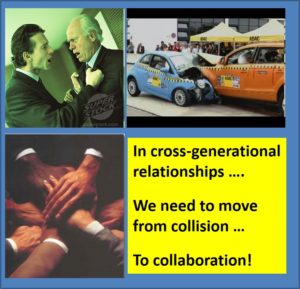 As both a diversity and career development consultant, I enjoy studying and presenting the topic of our multiple generations in the workplace and generational diversity. (Link to my blog on the growing areas of diversity that I published in 2012.) Generational diversity is now one of the most discussed diversity topics.
As both a diversity and career development consultant, I enjoy studying and presenting the topic of our multiple generations in the workplace and generational diversity. (Link to my blog on the growing areas of diversity that I published in 2012.) Generational diversity is now one of the most discussed diversity topics.
I am always saddened when I hear the generations rag on each other. Older people often comment that the younger generation feels so entitled, wants everything handed to them, is lazy, and cannot stick with anything. And then some young people complain about how older employees are slow, stuck in their ways, not open to change and judgmental.
Instead of a workplace collision around the generations, there should instead be workplace collaboration. The generations do have so much to offer each other in terms of vast knowledge, marketplace awareness, creativity and enthusiasm.

Thanks to Sheila Forte-Trammel (link) for coming up with the “from collision to collaboration” idea.
1. They are open to new ideas and like to think “outside the box.” They are looking for new and better ways to do things.
2. They are not afraid to take ideas up to senior leadership quickly. Too often some seasoned professionals express fear or hesitancy with taking some of my ideas to their leadership, whereas the millennials will just “go for it.”
3. Discussions are fast and crisp. In a recent meeting with a young leader at a tech company, we hit about a half dozen different topics in less than 45 minutes. And younger professionals can answer a question in 2-3 sentences, and they are indeed complete answers.
4. They are often leaders in diversity and inclusion within their companies. Having grown up in an era where diversity was there and assumed, they are much more attuned to the business value of being fully inclusive of everyone.
5. They value jobs that offer them personal growth. Many millennials strive to find professions that align with their passions and then excel in those jobs.
And while I was writing this blog, Anne-Lise Gere of Gere Consulting Associates, an excellent HR consultant I have met a number of times, published an article about retaining Millennial talent. Do link to this resourceful article, “Revisiting Turnover Myths For Your Millennial Workforce.”
And now perhaps some millennial out there will be inspired to write a blog on how they enjoy working with seasoned experienced baby boomers like me!


